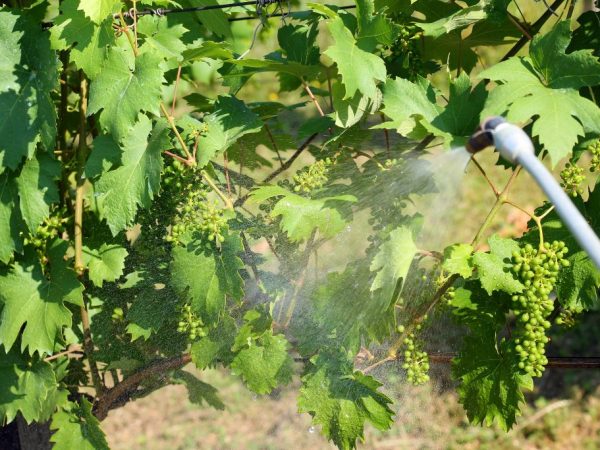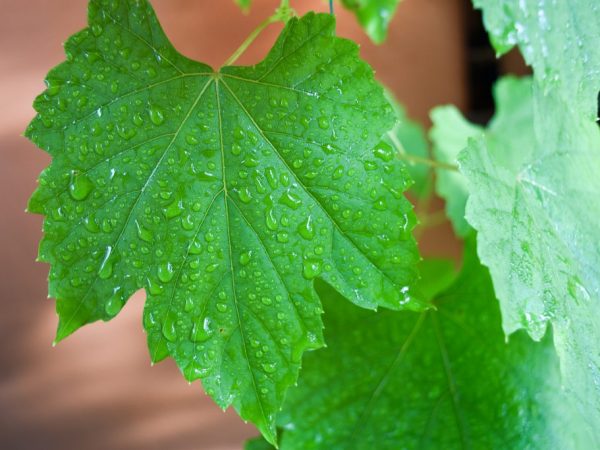Application of Nitrofen for grapes
Nitrofen is a complex action drug and at the same time an insecticide, fungicide and acaricide. It is advised to use the drug in early spring even before biological awakening and in the autumn against pests and pathologies. The optimal rate is 200-300 g per 10 liters of water. Nitrofen and grapes interact well.

Application of Nitrofen for grapes
Indications for use
The diseases in which Nitrofen is used are very diverse, therefore the instructions for use cover several problems at once.
Fruit trees can be exposed to various kinds of pests and diseases, which are best eliminated with the help of Nitrofen. These include ticks, aphids, leaf spot, scab, etc.
The effectiveness of the drug in the fight against weeds should not be underestimated. The soil lends itself to processing with Nitrofen during early spring.
Chemical action
After spraying, the chemical remains in sufficient quantities on absolutely any surface, protects cultivated plants (especially different grape varieties) and trees that are already bearing fruit for a long time.
After penetration into the soil, Nitrofen inhibits the growth of weed crops for a long time, but at the same time it is not purposefully used as a herbicide in private lands, because capable of creating unstable soil salinization.
Composition and form of release
The drug is a product of the nitration process of phenols of coal-tar origin and is a dark brown mass, similar in consistency to a paste with the smell of hydroxybenzene. The composition of the substance includes products of nitration of alkyphenols (64-74%), water (26-36%), OP-7 or OP-10 (up to 3%). Nitrofen is highly soluble in water, hydroxides, benzene, ethers.
Due to its chemical properties, when in contact with the skin and mucous membranes, it causes local irritation and burns, followed by adverse symptoms.
Rules for using the drug

The drug will help to cope with diseases
To make a working solution, 200 g of Nitrofen will be needed, which are dissolved in 10 liters of water. To disinfect the soil, take 300 g per 9 liters of water. For 1 adult plant from 10 to 30 liters of water. For each type, the instruction provides a different dose.
- Berry bushes. To prepare a solution for spraying, about 150 g of the drug is diluted in 10 liters of water, and the bushes and soil are processed after the leaves fall. This 3% solution for grapes is used in the amount of 2-2.5 liters per 10 m².
- For strawberries, a 2% solution is used: dissolve 200 g of the drug in 10 liters of water.
- Weeds: 300 g of the product per 10 liters of water.
Safety engineering
The product is used to combat harmful insects and various diseases that can adversely affect the yield and the growth and development of crops. The drug is especially dangerous for humans and animals, so it is important to take precautions.
It is better to move pesticides in a sealed container.Before spraying, familiarize yourself with the composition, find out the consumption rate, degree of toxicity, shelf life, etc.
Work and contact with the drug are contraindicated in children, sick and pregnant or lactating women. To prepare the working solution, prepare the equipment and do not use it in the future. It is also necessary to prepare clothes: it must be working, with an apron, rubber gloves, shoes, a respirator or gauze bandage, sealed goggles.
You should choose calm, cloudy weather. Chemical spraying should not be carried out during the flowering period in order to avoid poisoning bees and generative flowers. Work on the garden is resumed after a certain period of time has passed and safety can be guaranteed.
Conclusion
Nitrofen is an effective insecticide-fungicide-acaracide used in the fight against diseases and pests of horticultural crops. Like any pesticide, it requires caution in its use.


